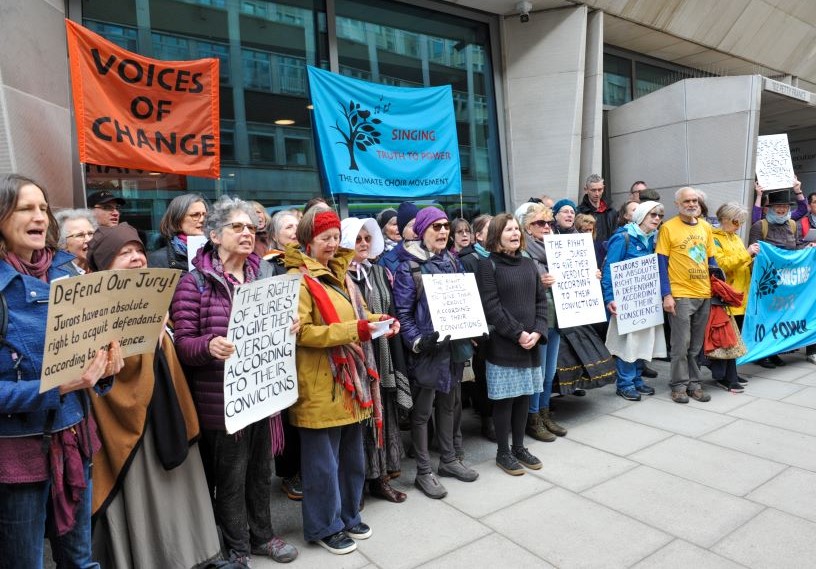Quakers re-enact 1670 City of London meeting to highlight threat to jury system
Quakers re-enacted a meeting for worship in Gracechurch Street, London, which led to the now-threatened right of juries to rule according to their convictions.

On Sunday, 7 April, Quakers met in silence to defend the right, established during the trial of two Quaker preachers for holding an unlawful assembly in 1670.
Around 150 demonstrators from Quakers, Christian Climate Action and Extinction Rebellion, some in period costumes, held a meeting for worship then walked to the Ministry of Justice.
The fast-growing Climate Choir Movement performed at the event, drawing attention to the grave threat posed to this freedom by judges banning defendants from mentioning climate breakdown in their defence.
Quakers from Devon and Cornwall held a Meeting for Worship outside the courts in Truro on the same day.
This ban follows the acquittal of defendants in some nonviolent civil resistance cases when they have explained their motivations in court.
In 1670, the established church held huge political power and suppressed minority faiths.
Despite a law preventing dissenters from congregating, two Quakers, William Penn and William Mead, held an open air meeting for worship and were charged with unlawful assembly.
When the jury refused to find Penn and Mead guilty, they were locked up without food and water for two days.
Later the Chief Justice of the Court of Common Pleas, Sir John Vaughan, ruled that a jury could not be punished on account of the verdict returned.
This ensured that juries are free from interference and can make decisions, according to their conscience, after hearing all the evidence.
The creeping ban on defendants discussing their motives as part of their defence is part of an authoritarian crackdown on environmental protest in the UK.
Earlier this year the UN special rapporteur on environmental defenders expressed serious concern over the UK's “draconian" new laws, the use of civil injunctions and restrictions on courtroom evidence.
Led by their faith to draw attention to how rising emissions have pushed the world to the edge of irreversible damage, Quakers are disproportionately represented in such cases.
Following a centuries-long tradition of trying to build a better future, six Quakers were recently added to its Court and Prison Register.
This register lists Quakers convicted for breaking the law for causes they believe in.
Many more are currently going through the court system, for peaceful action on climate crisis and for opposing the UK weapons industry.
Quaker Phil Laurie said: “These restrictions are currently primarily being used against climate and human rights protestors, but there is no reason why this won't spread throughout our legal system.
“This is especially likely to happen when our prosecution service is so underfunded that it is failing us badly."